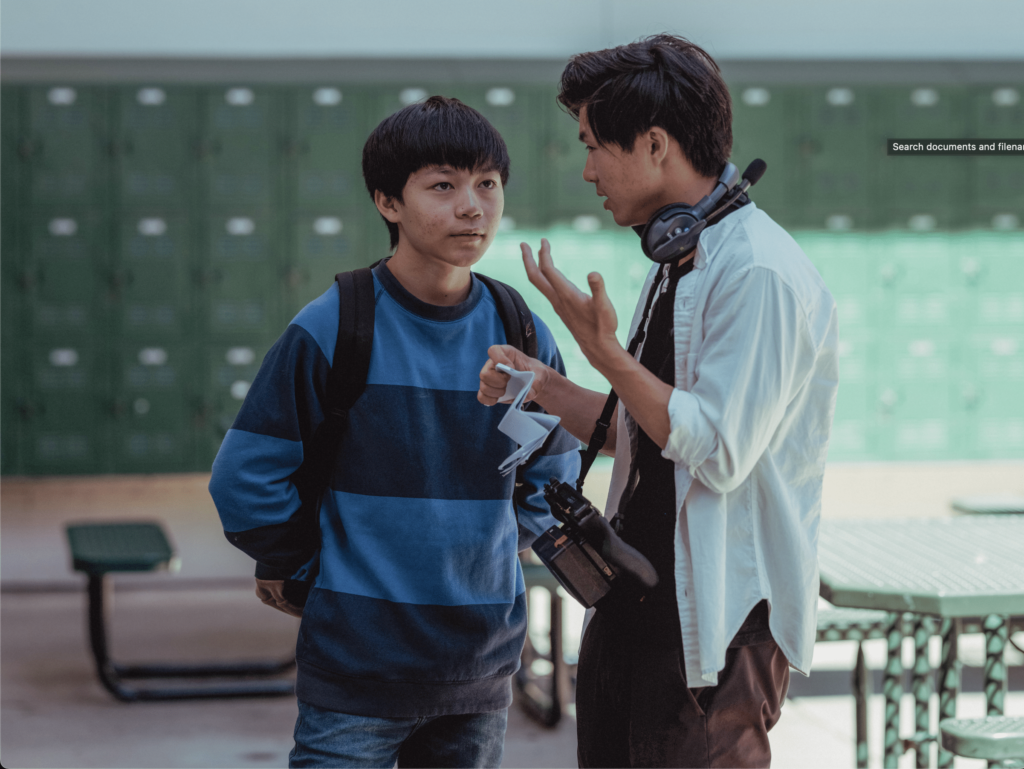Sean Wang’s debut film, Dìdi, has emerged as a poignant and authentic exploration of
the Asian American teenage experience, earning critical acclaim for its nuanced portrayal
of cultural identity, familial relationships, and the unique challenges of growing up in the early digital age.
Set against the backdrop of 2008, a time of burgeoning social media platforms like MySpace and AIM, the film delves into the life of Chris Wang, a 13-year-old Taiwanese American boy navigating the complexities of adolescence while grappling with his place within a predominantly white cultural landscape.

The film’s semi-autobiographical nature allows for an intimate and emotionally resonant portrayal of Chris’s journey, mirroring Wang’s own experiences as a second-generation Taiwanese American growing up in Fremont, California. In an exclusive interview with Resonate, Sean reflects, “Like our protagonist, I was also raised in Fremont, California, as the son of Taiwanese immigrants…and grew up with a deep-seated shame that was directly linked to my cultural heritage.”
This personal connection infuses the film with a raw authenticity, as it explores the “conflict between reconciling the beauty and pain of who you are, while navigating the uncertainty of who you have yet to become.”
One of the film’s central themes is the intricate dance between cultural heritage and American identity. Chris struggles to reconcile his Taiwanese roots with his desire to fit in with his predominantly white peers, often feeling like an outsider among outsiders. This internal conflict is mirrored in his strained relationship with his mother, Chungsing, played with quiet strength by veteran actress Joan Chen.
Read more: ‘Dìdi (弟弟)’ Trailer: Get Ready For a Nostalgic Coming-of-Age Tale From Sundance Darling Sean Wang
The film delicately explores the unspoken tensions and communication barriers that often arise between immigrant parents and their American-born children, highlighting the generational gap and the clash of cultural values.
“For many first-generation Asian American children of immigrants, I believe that shame is often shared and inextricably tied to our cultural identity,” Wang shares. Dìdi explores this shame through Chris’s experiences with microaggressions, racial stereotyping, and a lack of representation in popular culture.
These “pernicious forms of racism,” as Wang calls them, can manifest into various forms of shame during adolescence, shaping a young person’s self- perception and worldview.


Dìdi also captures the unique experience of coming of age in the early digital age, where social media and technology were rapidly transforming the way teenagers interacted and defined themselves. Chris’s anxieties and insecurities are amplified by his online interactions and the pressure to curate a perfect online persona on platforms like MySpace. The film’s portrayal of these early online spaces resonates with audiences who grew up in that era, evoking a sense of nostalgia while also highlighting the challenges of navigating identity formation in an increasingly digital world.
Sean Wang’s Dìdi is a triumph of personal filmmaking, a poignant and insightful exploration of the Asian American teenage experience
Wang’s commitment to authenticity is evident not only in the film’s production but also in its casting. As Wang puts it, “The kids we cast were incredible. Our casting directors spent eight months finding kids who were raw and electric. Isaac [who plays Chris] was one of the first we saw, and he had the perfect blend of trained actor and teenage punk. We knew immediately he was magical.” This dedication to finding the right actors who could embody the raw emotions and experiences of adolescence is evident in the film’s powerful performances.
The film’s title, Dìdi, is a term of endearment meaning “little brother” in Mandarin, reflecting the close-knit family dynamic and the cultural context of the story. This emphasis on family and cultural heritage is a recurring motif throughout the film, as Chris grapples with his identity as both a Taiwanese American and a teenager on the cusp of adulthood.
“Dìdi” is a love letter to the Asian American experience, capturing the nuances of cultural identity, familial relationships, and the challenges of growing up in a world that doesn’t always reflect your own. As Wang articulates, “Dìdi is not an Asian American story – it is simply about an Asian American.” By writing to the specifics of setting, race, and culture, Wang has populated his film with vibrant characters that reflect the rich cultural tapestry of Fremont’s population, and by extension, the United States.

In a world saturated with content, Wang’s advice to aspiring filmmakers rings true: “Make things that are close to home and that you care about…Focus on what’s important to you, the things that keep you up at night, and the questions you have about yourself, the world, and your family. Look inward and create stories that resonate with you, as those will likely resonate with others too.” With “Dìdi,” Wang has done just that, creating a film that speaks to the heart of the Asian American experience and resonates with audiences from all walks of life.
Sean Wang’s Dìdi is a triumph of personal filmmaking, a poignant and insightful exploration of the Asian American teenage experience. With its relatable characters, authentic portrayal of cultural nuances, and timely exploration of the impact of technology on adolescence, Dìdi has the potential to spark important conversations and inspire a new generation of filmmakers. As Wang himself stated, “There’s so much content out there. If I’m asking for someone’s attention, I want to make sure it’s worth it. I want my films to be both entertaining and meaningful.” Dìdi is undoubtedly both, and its impact will likely be felt for years to come.









